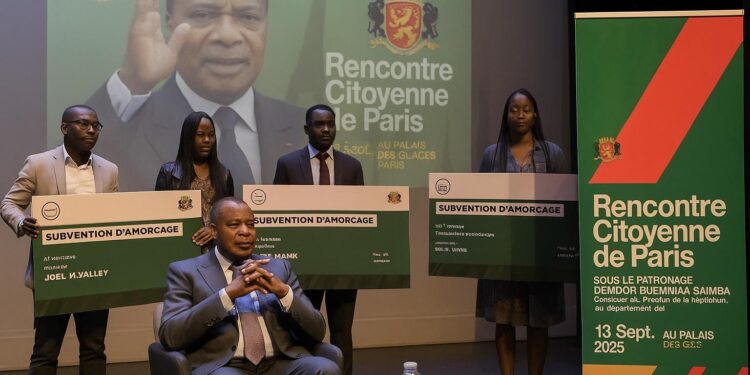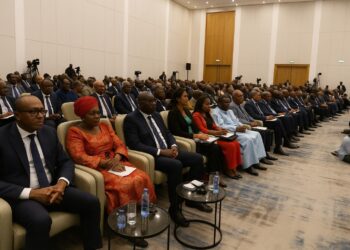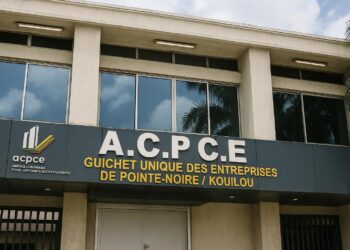Diaspora Seed Capital Signals Confidence
At a citizen gathering in Paris on 13 September, the Diaspora Impulse, Guarantee and Support Fund, better known as Figa, awarded €1,500 in seed money to three ventures. Among the laureates, the Association Développement Nord-Sud secured backing for its African Valley artificial-intelligence hub.
Co-founders Kakama Léo-Cady and Dimitri M’Foumou-Titi view the grant as both endorsement and catalyst. Speaking after the ceremony at the Palais des Glaces, M’Foumou-Titi said the contribution “marks a decisive milestone toward building a centre that can radiate across the Congo Basin and beyond”.
Blueprint for an AI Ecosystem in Ngoyo
African Valley is slated for Ngoyo, a fast-growing district of Pointe-Noire. The project’s designers envision a purpose-built campus hosting laboratories, co-working space and demonstration facilities, all wired for high-performance computing. By locating near the port city’s fibre networks, the initiative hopes to minimise infrastructure bottlenecks.
ADRNS positions the hub as a springboard for Congo-Brazzaville to stake a claim in advanced technologies. Organisers argue that a domestic platform for research, prototyping and pilot use-cases could reduce dependence on imported solutions while encouraging relevant algorithms in health, agriculture, logistics and public finance.
Upskilling the Workforce for Industry 4.0
Training forms the backbone of the concept. African Valley plans modular courses in machine learning, data engineering and cloud architecture open to students, professionals and civil servants. Partners are exploring hybrid delivery, mixing online resources with hands-on workshops to broaden access beyond Pointe-Noire’s urban core.
Mentors intend to embed gender parity targets. “We want young women to see coding and AI not as distant specialities but as attainable careers,” Léo-Cady explained, noting that scholarships are budgeted to cover at least forty per cent female enrollment in the first cohort.
Start-up Incubation and Investor Networking
Beyond education, the blueprint reserves space for an incubator able to host up to twenty start-ups simultaneously. Selected ventures will receive mentorship on regulatory compliance, intellectual-property strategy and access to pilot datasets from ministries, subject to data-protection guidelines recently updated by the Congolese regulator.
Networking events — hackathons, investor roadshows and policy roundtables — will be convened quarterly. Organisers aim to connect diaspora engineers, regional family offices and programmes such as the AfDB’s Coding for Employment initiative, weaving the hub into broader continental value chains.
Alignment with Global Sustainable Goals
African Valley’s promoters highlight consistency with several Sustainable Development Goals. By prioritising digital literacy, the project addresses SDG 4 on quality education. The gender-inclusive governance framework responds to SDG 5, while the job pipeline for data scientists and developers contributes to SDG 8 on decent work and economic growth.
On the industrial front, establishing a regional computing cluster meets SDG 9 by reinforcing innovation infrastructure. Talks with equipment suppliers underline intentions to source energy-efficient servers, aligning with Congo’s climate commitments under the Paris Agreement and its Forestry and Climate Change Investment Plan.
Financing Path and Partnership Opportunities
While the €1,500 cheque covers preliminary expenses, ADRNS is structuring a blended-finance package for the construction phase. Organisers cite conversations with local banks, impact investors and the Central African States Development Bank regarding concessional lines that could leverage additional diaspora remittances.
A phased roll-out is envisaged. The first semester focuses on securing land tenure and architectural studies; the second on installing core connectivity and training the trainer programmes. Management anticipates onboarding the inaugural cohort of learners by the fourth quarter, subject to regulatory clearances from municipal authorities.
Private-sector participation remains pivotal. Telecom operators exploring 5G pilots view African Valley as a testbed, officials say. Agribusiness exporters have also flagged interest in predictive analytics for supply-chain optimisation, illustrating commercial applications that could anchor the hub’s revenue model.
Strategic Positioning within Central Africa
By situating the initiative in Pointe-Noire, organizers believe they harness a unique logistics corridor linking maritime trade with Cabinda, Kinshasa and inland Brazzaville. This geography, they argue, can facilitate cross-border data collaborations and attract regional founders seeking proximity to shipping lines and energy infrastructure.
Government agencies have welcomed the prospect. A representative of the Ministry of Posts, Telecommunications and Digital Economy, present at the Paris event, noted that the project “supports the national digital transformation strategy and complements existing e-government platforms,” signalling potential alignment with forthcoming incentive frameworks.
For now, the African Valley team is concentrating on community outreach in Ngoyo, organising town-hall discussions to explain the venture’s employment prospects. As M’Foumou-Titi put it, “building servers is the easy part; building trust with citizens, educators and policymakers is what will ultimately power the algorithms.”
Navigating Emerging AI Governance
Observers underline that African Valley emerges as international debates on AI regulation intensify. Congo participates in the African Union’s working group on responsible AI, and lessons from that forum are expected to shape the hub’s ethics charter.
Legal experts consulted in Brazzaville suggest that sandboxes for algorithmic testing could complement existing fintech frameworks overseen by the Bank of Central African States, offering innovators clearer compliance pathways without compromising consumer protection.












































